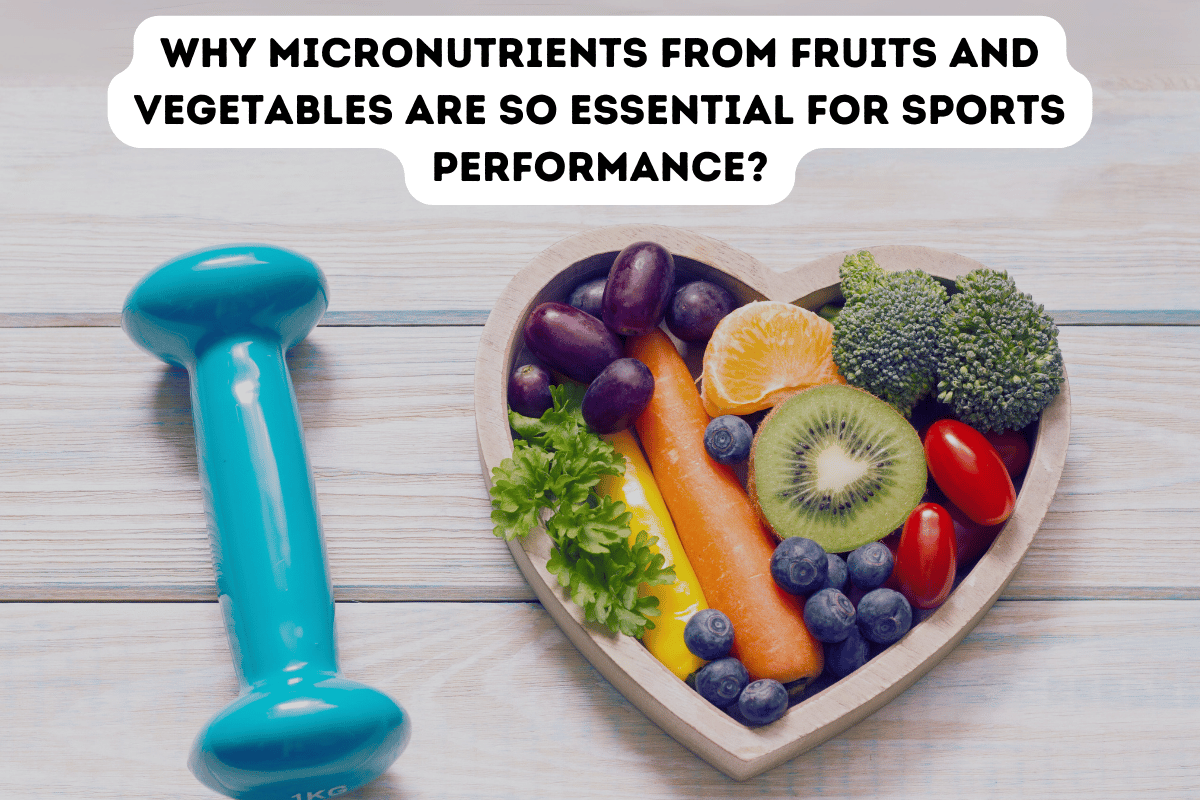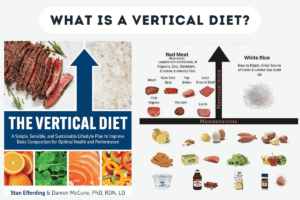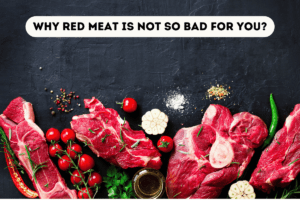Many athletes understand that optimising nutritional intake is essential for improving sports performance. They know the importance of protein, carbohydrates, and fat for their sports goals but sometimes forget about micronutrients in their diet, which they can get particularly from fruits and vegetables. Micronutrients in fruits and vegetables play an important role in maintaining health, energy production and tissue recovery during exercise and training. On the other hand, a lack of micronutrients in diet can lead to fatigue, muscle damage, lack of strength and low immune function. These can lead to poor training and recovery, bad sports performance and low energy levels.
The importance of eating five portions of fruits and vegetables a day is well known. Fruits and vegetables contain essential vitamins and minerals, fibre, different phytochemicals, and powerful antioxidants that protect the body from harmful free radicals. People who eat enough fruits and vegetables have a lower risk of getting diseases like cancer, high blood pressure, obesity, heart problems, and stroke. The main benefit of fruits and vegetables for athletes is that they provide different micronutrients necessary for better sports performance.
The main micronutrients that athletes need are vitamins, minerals, antioxidants, and nitrates. Vitamins are organic elements required in small amounts for health and physical performance. Vitamins are essential for athletes because they are involved in energy production, exercise performance, functioning of the immune system, hormonal system, and nervous system. Minerals are inorganic elements that help to form the structure of bones and teeth. Others control fluid balance in tissues, muscle contraction, nerve function, and formation of blood cells. Like vitamins, they can’t be produced in the body and must be obtained from the diet. Antioxidants can help athletes decrease free radical damage to their bodies by neutralising free radicals. These include manganese, selenium, zinc, vitamins C and E, phytochemicals, carotenoids, bioflavonoids, and tannins. Nitrates, found in a range of vegetables, can help improve sports performance by increasing blood flow to working muscles, which results in greater oxygen delivery. Nitrates can also help reduce resting blood pressure.
Also, it is essential to answer a question: “Do athletes get enough micronutrients from the fruits and vegetables they eat, or do they need additional supplements that provide them with different micronutrients?”. Due to regular, intense exercises, all athletes get additional pressure on the body, which can increase requirements for many micronutrients. Failure to get enough micronutrients can lead to less energy, making athletes more vulnerable to minor infections and illnesses. Now, let’s look at all these facts step by step.
What are the most essential vitamins and minerals for an athlete?
Micronutrients play an important role in sports performance. They are vital in energy production, bone health, immune function, protection against oxidative stress, and muscle tissue repair during recovery. Failure to get enough micronutrients can lead to a lack of energy and make an athlete vulnerable to minor infections and illnesses. The main micronutrients necessary for an athlete are shown in the picture below.
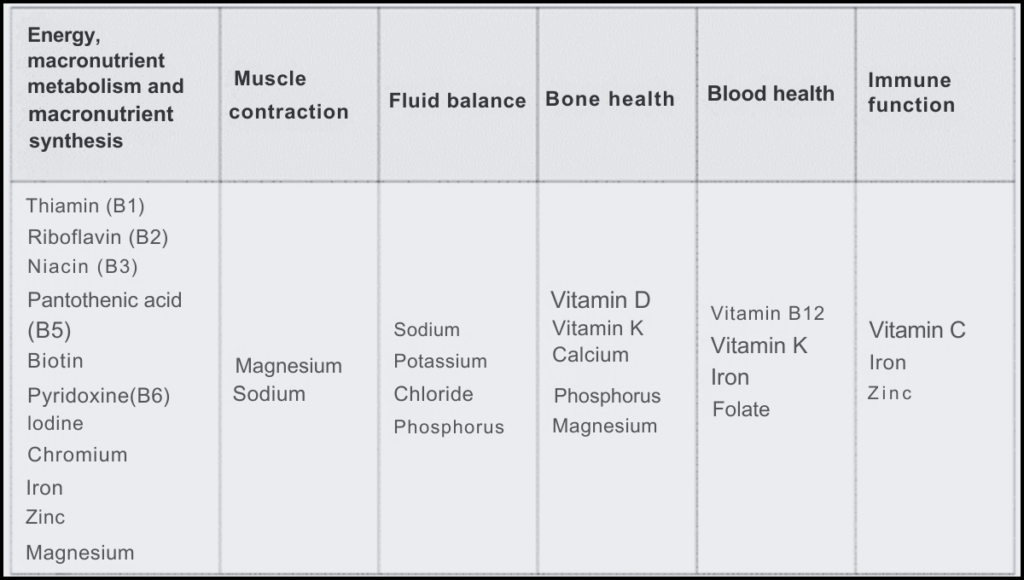
There are two types of micronutrients—vitamins and minerals. Vitamins are organic compounds classified into water-soluble (B-group vitamins and vitamin C) and fat-soluble vitamins (A, D, E, K). Water-soluble vitamins can’t be stored in the body and are excreted in the urine. Fat-soluble can be dissolved in lipids and stored in the body. The minerals are inorganic chemical elements and can be classified into macro-minerals (we need more than 100 micrograms per day) and micro-minerals (are required in smaller amounts). The main vitamins and minerals necessary for an athlete are:
1) B vitamins, iodine and chromium for energy metabolism. B vitamins are mainly involved in energy production, protein and fatty acid synthesis, and carbohydrate metabolism. Minerals like iodine and chromium are involved in energy metabolism.
2) Calcium and vitamin D for bone health. Calcium is a component of bones that combines with phosphorus to strengthen bones. Vitamin D helps with the absorption of Calcium and phosphorus. Also, an important role in bone strength plays magnesium, fluoride and vitamin K. Additionally, Calcium has a role in muscle contraction, nerve conduction and blood clotting. Sometimes, it’s difficult to get enough vitamin D from the sun or diet alone. So, if an athlete thinks he may be deficient in vitamin D, he should consult a doctor, who can recommend a simple blood test to determine whether he needs vitamin D supplements. From April to September, most people can get all vitamin D from sunlight exposure, but in winter months, Public Health England recommends taking 10mcg of supplements.
3) Iron, B12, folate and blood health. Iron is necessary for an athlete because it is responsible for the formation of haemoglobin (which transports oxygen in the blood) and myoglobin (which transports oxygen in the muscle cells). Athletes have higher iron requirements than sedentary people. Iron losses can occur mostly during running and other aerobic activities. Women athletes who eat less than 2000 kcal daily are especially at risk of iron deficiency. Folic acid and B12 are also important for an athlete because they are involved in red blood cell production in the bone marrow. Vegans who eat no animal products can be deficient in B12 and must obtain it from fortified foods or supplements.
4) Zinc and magnesium. Zinc and magnesium have many roles in the body. They are involved in energy metabolism, growth, muscle tissue repair, immune function, protein synthesis, and muscle contraction. Athletes may experience magnesium and zinc loss through sweat and urine. Deficiencies can mostly occur among vegetarian or female athletes and affect athletic performance.
5) Potassium, sodium, chloride, and fluid balance. Sodium, potassium, and chloride are electrolytes that maintain fluid balance. They also have a role in nerve-impulse transmission and muscle contraction. Athletes can experience electrolyte losses through sweat.
6) Vitamin E, vitamin C, beta carotene – antioxidants. Vitamin E, vitamin C and beta-carotene are essential for athletes because of their antioxidant properties. They can protect an athlete against exercise-related cell damage. Also, vitamin C is required to form connective tissue and certain hormones (for example, adrenaline). It is involved in forming red blood cells enhancing iron absorption.
7) Other antioxidants. Other antioxidants include manganese, selenium, zinc, phytochemicals, bioflavonoids, and tannins. They also protect an athlete against exercise-related cell damage. All antioxidants are enzymes and nutrients in the blood that disarm free radicals and render them harmless. They work as free radical scavengers by donating one of their electrons to neutralise the free radical. Not all free radicals are damaging. Some help to kill germs, fight bacteria and heal cuts. The problem arises when too many are formed, and body’s system can’t control them. Large numbers of free radicals can create heart disease, many cancers, ageing and post-exercise muscle soreness. The best source of antioxidants is in food, mainly fruits and vegetables.
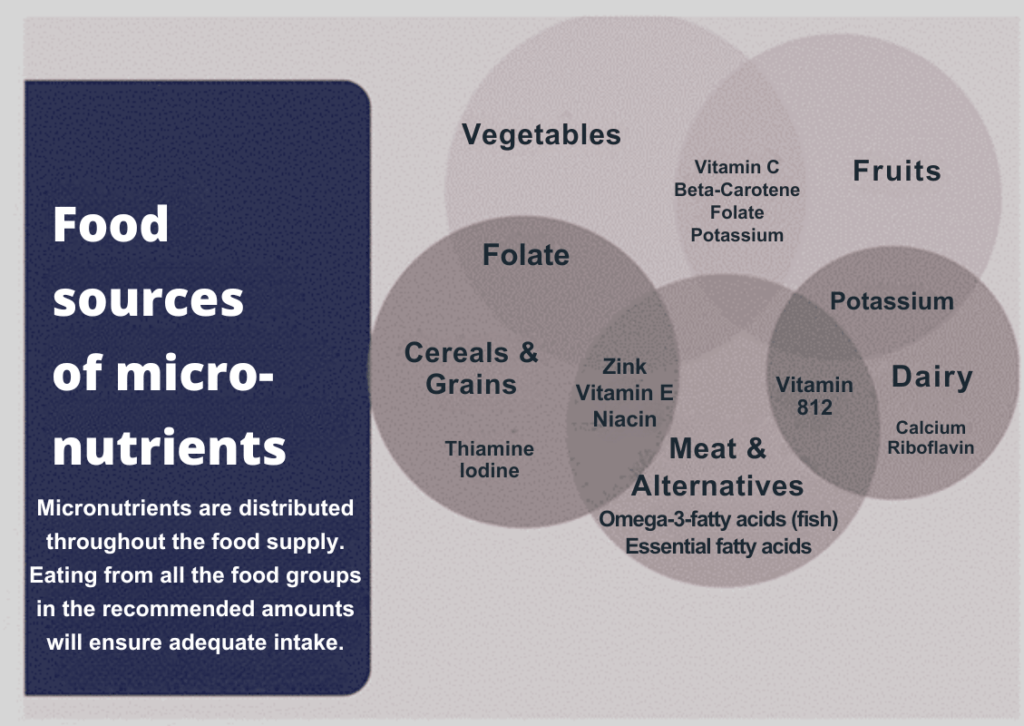
Looking at all these vitamins and minerals necessary for an athlete’s performance, it’s obvious that eating just fruits and vegetables is not enough to get all the micronutrients. However, we can also see fruits and vegetables’ critical role in our diet. They are a great source of vitamin C, beta-carotene, folate, and potassium. Overall, looking at what vitamins and minerals are essential for the athlete, athletes should eat a well-balanced diet with lots of fruits and vegetables to get all the nutrients necessary for sports performance. About what other food groups athletes should eat to improve sports performance, you can read my article: “What is a balanced diet?”.
The power of Nitrates
Nitric oxide (NO) is a signalling molecule involved in numerous vascular and cellular functions, such as cellular respiration, vasodilation, and angiogenesis. NO can improve exercise performance by decreasing fatigue during exercise, increasing nutrient and oxygen delivery to the working muscles, and increasing excretion of metabolic by-products during high-intensity exercise. The biggest source of nitrates are beetroot or beetroot juice. Also, nitrates can be found in small amounts of such vegetables like spinach, rocket, cabbage, leeks, and broccoli.
Beetroot may help improve performance time in endurance activities lasting from 4 and 30 minutes, as well as high intensity activities involving single or multiple sprints. The best is to take 500 ml of beetroot juice, or 70ml of concentrated shot, or 200g of cooked beetroot 2-3 hours prior to exercise. Alternatively, athlete can use nitrate loading for 3-7 days prior to a competition to ensure blood levels of NO remain high. Nitrate can be also taken in a form of sodium nitrate supplements. And there are no serious side effects from using beetroot juice in such quantities. The only issue can be temporary pink coloration of urine and stools.
Do athletes need supplements?
Athletes have higher energy needs than average people and need more vitamins and minerals in their diet. Usually, athletes avoid nutrient deficiencies by eating a balanced diet, but there can be specific situations when athletes may need additional supplementation. It can be athletes with high sweat and urine losses (loosing electrolytes and zinc), athletes with low energy intake or specific dietary preferences (vegetarians and vegans). Vitamin D concentrations may be low in athletes training and competing in winter sports or indoors. Iron stores can be compromised in athletes undertaking high intensity and endurance-based exercises.
So, there is situations where athletes may need additional supplementation, but before doing so, they always need to consult with doctor who will be able to analyse their diet and give appropriate advice about whether supplement are necessary or not. Simple blood test is a good option. And even when athletes are lacking in some micronutrients, they should try to get all the nutrients from their diet first. And when it’s not possible to get all the nutrients from a well-balanced diet, then supplements can be taken.
Athletes must know that there are no additional benefits of taking extra micronutrient supplements to improve sport performance. Beneficial effect can be observed just in those athletes who started with low levels of vitamins and minerals. In other words, taking supplements simply restores athletes stores to normal levels. Moreover, vitamins and minerals taken in high doses from supplements can be harmful (especially fat-soluble vitamins). As to real food, it’s almost impossible to overdose on vitamins and minerals from the real food.
Conclusion
The main aim of these article was to show benefits of eating 5 portions of fruits and vegetables a day, and its importance for sport performance. The main benefit for an athlete of eating 5 a day, is micronutrients that they get from fruits and vegetables (vitamins, minerals, antioxidants, and nitrates). It was revealed that athletes can’t get all these micronutrients just from fruits and vegetables alone, but fruits and vegetables play a very big role in providing majority of these micronutrients, especially antioxidants. Fruits and vegetables are a great source of vitamin C, beta-carotene, folate, and potassium. To get all the nutrients, necessary for sport performance, athletes should eat a well-balanced diet. As to micronutrient supplements, they are unnecessary for those athletes who consume a varied diet with enough fruits and vegetables. If athlete is thinking that he is lacking in some vitamins and minerals, he should consult with doctor who will be able to analyse his diet and give appropriate advice about whether supplements are necessary or not.

